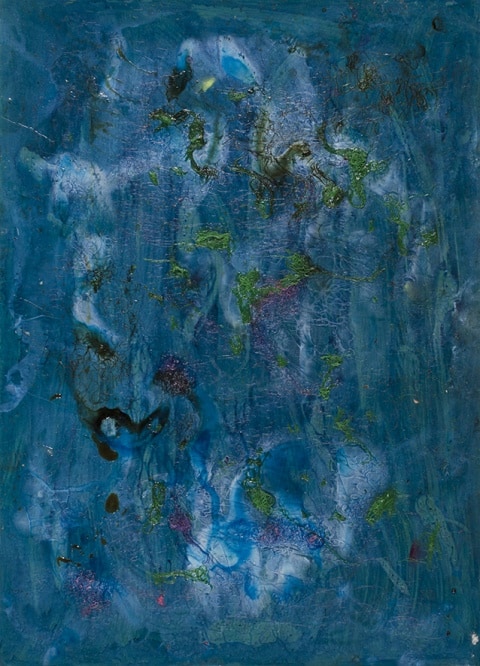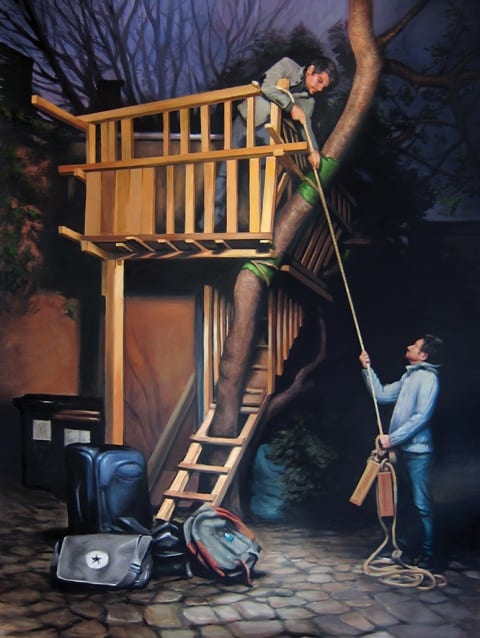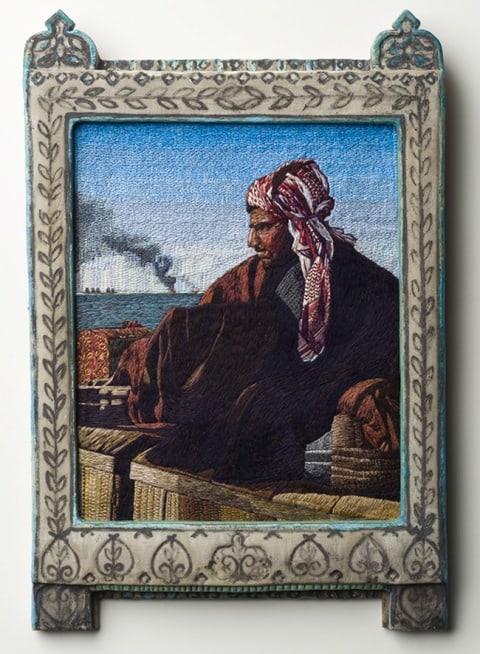Genna Gardini reviews Poisson, the fishy fable currently showing at the Baxter
At this year’s National Arts Festival, I found myself in the audience of a discussion on the future of South African Playwrighting. During the Q&A, columnist Suzy Bell asked the mostly male (except for theatre critic Adrienne Sichel) panel who, in their opinions, the new South African female playwrights to watch out for were. After an uncomfortable pause and a lot of mumbling, someone finally said, “Oh, and, of course, don’t forget: Juliet Jenkin!” It’s no easy job to forget Jenkin, the writer and half of the two-person cast of Poisson. I first saw her playwriting debut, the acclaimed Boy Who Fell From the Roof, in 2007 and found it difficult to get the Naledi Award-nominated script out of my head. The writing wasn’t like anything I’d ever seen locally before: pithy and heartbreaking, it managed to skate neatly around quirkiness without ever coming across as too contrived. Since then, Jenkin’s been busy at establishing herself in the Cape Town theatre scene, performing in Marthinus Basson’s Anthony and Cleopatra in 2010 and working for Roy Sargent’s Artscape New Writing Programme. Her latest play, Poisson, premiered at the 2011 National Arts Festival in July, as part of its Arena programme. I had read some middling-to-low reviews of an earlier piece, Venom, and heard that this latest offering relied too heavily on pop music and fashion to get by, so, when I got around to seeing it at the Baxter, I was prepared to be disappointed. Happily, this wasn’t the case. Set on a beach in the middle of the Eastern Cape, the story follows two sisters who meet for a bit of recon before a reunion with their father. The preset involves Roxanne Blaise (Sister Breyani) lying prostrate on a deck chair before the small auditorium is blasted with music and Jenkin enters in red ballet shoes, like the scenester granddaughter of Moira Shearer, moshing en pointe. It’s a bit strange to describe a play named Poisson (French for fish) as relentlessly fresh, but that’s exactly what it is. Devices that could have come across as trite or overly mannered are, in its paddling hands, are winning and funny. With a cast of two, the success of the play hinges almost entirely on the performances of and relationship between the two characters, but, luckily, Blaise and Jenkin have a believable, sororal chemistry that rides out the whirlpooling plot to the end. Jenkin is all mohawk and muscle-spasms, spastically pas de deuxing across the boards to the soundtrack (her epileptic twitching during a Bob Dylan track, unable to find the words to describe him, is a highlight). While her dervish sister pliés and tangles herself in the litter slicing the sandy set, the impressive Blaise remains perfectly stationary on her deck chair. Even almost horizontal, you can sense the real straining and containing taking place under her luminous duvet. The script itself is tidal, washing back after every large crash to reveal something new and unexpected has been left behind. Director Christiaan Olwagen, who recently won the Fleur de Cap Best New Director Award, cleverly plays with music and lighting, most notably in the climax. The use of it is very contemporary- I don’t know how I’d take to hearing Lady Gaga sing while a woman in a gold lamé hoodie talks fracking in, say, five years time- but that’s part of its charm. The play feels like now. There’s a real thrashing urgency in Poisson. You’re aware of it rushing towards and receding from its ending in a way that almost makes you understand what the good Sisters of the Sound of Music were getting at when they wondered how you pin a wave upon the sand. Poisson was on at the Baxter’s Golden Arrow Studio from 15 July 2011. How Do You Pin A Wave Upon The Sand? Genna Gardini reviews Poisson, the fishy fable currently showing at the Baxter. At this year’s National Arts Festival, I found myself in the audience of a discussion on the future of South African Playwrighting. During the Q&A, columnist Suzy Bell asked the mostly male (except for theatre critic Adrienne Sichel) panel who, in their opinions, the new South African female playwrights to watch out for were. After an uncomfortable pause and a lot of mumbling, someone finally said, “Oh, and, of course, don’t forget: Juliet Jenkin!” It’s no easy job to forget Jenkin, the writer and half of the two-person cast of Poisson. I first saw her playwriting debut, the acclaimed Boy Who Fell From the Roof, in 2007 and found it difficult to get the Naledi Award-nominated script out of my head. The writing wasn’t like anything I’d ever seen locally before: pithy and heartbreaking, it managed to skate neatly around quirkiness without ever coming across as too contrived. Since then, Jenkin’s been busy at establishing herself in the Cape Town theatre scene, performing in Marthinus Basson’s Anthony and Cleopatra in 2010 and working for Roy Sargent’s Artscape New Writing Programme. Her latest play, Poisson, premiered at the 2011 National Arts Festival in July, as part of its Arena programme. I had read some middling-to-low reviews of an earlier piece, Venom, and heard that this latest offering relied too heavily on pop music and fashion to get by, so, when I got around to seeing it at the Baxter, I was prepared to be disappointed. Happily, this wasn’t the case. Set on a beach in the middle of the Eastern Cape, the story follows two sisters who meet for a bit of recon before a reunion with their father. The preset involves Roxanne Blaise (Sister Breyani) lying prostrate on a deck chair before the small auditorium is blasted with music and Jenkin enters in red ballet shoes, like the scenester granddaughter of Moira Shearer, moshing en pointe. It’s a bit strange to describe a play named Poisson (French for fish) as relentlessly fresh, but that’s exactly what it is. Devices that could have come across as trite or overly mannered are, in its paddling hands, are winning and funny. With a cast of two, the success of the play hinges almost entirely on the performances of and relationship between the two characters, but, luckily, Blaise and Jenkin have a believable, sororal chemistry that rides out the whirlpooling plot to the end. Jenkin is all mohawk and muscle-spasms, spastically pas de deuxing across the boards to the soundtrack (her epileptic twitching during a Bob Dylan track, unable to find the words to describe him, is a highlight). While her dervish sister pliés and tangles herself in the litter slicing the sandy set, the impressive Blaise remains perfectly stationary on her deck chair. Even almost horizontal, you can sense the real straining and containing taking place under her luminous duvet. The script itself is tidal, washing back after every large crash to reveal something new and unexpected has been left behind. Director Christiaan Olwagen, who recently won the Fleur de Cap Best New Director Award, cleverly plays with music and lighting, most notably in the climax. The use of it is very contemporary- I don’t know how I’d take to hearing Lady Gaga sing while a woman in a gold lamé hoodie talks fracking in, say, five years time- but that’s part of its charm. The play feels like now. There’s a real thrashing urgency in Poisson. You’re aware of it rushing towards and receding from its ending in a way that almost makes you understand what the good Sisters of the Sound of Music were getting at when they wondered how you pin a wave upon the sand. Poisson was on at the Baxter’s Golden Arrow Studio from 15 July 2011.
{H}



